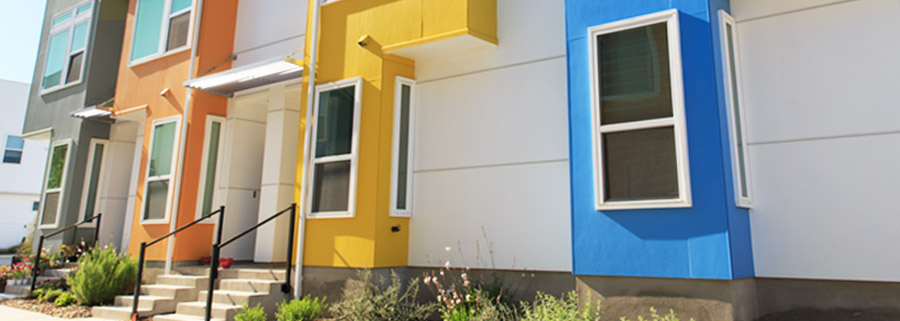
What’s the difference between a condo and an apartment?
When deciding whether to buy a condo or rent an apartment, it’s helpful to understand the differences between the two. Renting an apartment provides flexibility to move when your lease is up, while investing in a condo provides an opportunity to build equity. Both can offer freedom from maintenance of the property, like yard work. The decision to rent or own is a personal one. Consider which one will be the best fit for your finances, preferences and lifestyle.
What’s a condo?
The term “condo” is an abbreviation of the term “condominium.” Condominiums are defined by the form of ownership rather than a style of building. Unlike an apartment, a condo is a private residence owned by an individual homeowner. Condo buyers own their units and a share of common use areas. They can be townhomes, duplexes, units in multi-story buildings, or even detached homes. Most condos are part of a homeowner association (HOA) that makes and enforces rules for its property.
Condo owners are primarily responsible for maintaining everything within their units. They also must pay mandatory membership fees for the upkeep of common areas and building maintenance costs. Because the HOA maintains common areas, condos typically don’t need as much upkeep as single-family homes.
Recent data from National Mortgage Professional lists the median price of an existing condo at 12% less than the single-family home’s median price. Lower-pricing can make condos a more affordable option for first-time homebuyers. Learn more about condo financing and how it differs from the mortgage loan process for single-family homes.
What’s an apartment?
An apartment is a rental property in a residential building or complex with multiple units. Apartment buildings are owned by a landlord or property management company that leases individual units to residents. For the most part, the units are similar, and the tenants follow the same guidelines for renting.
Top 10 differences of condos vs. apartments
- 1. Homeownership
Ownership is the main difference between condos and apartments. An individual owns a condo. There’s no ownership when living in an apartment; your monthly rent pays for the roof over your head.
- 2. Monthly mortgage fee predictability
Rent is likely the only monthly fee you’ll pay for an apartment, but this fee can increase at any time. While HOA dues may go up, buying a condo with a fixed-rate loan assures you’ll pay a predictable monthly loan payment.
- 3. Initial move-in expenses
Apartments may require first and last month’s rent, as well as a security deposit. Buying a condo may require a down payment and closing costs.
- 4. Maintenance and repairs
As an apartment renter, you won’t have to worry about household repairs like fixing a leaky sink or replacing a broken appliance. In most states, landlords are responsible for completing repairs within a reasonable time frame to keep the property in habitable condition. When you own a condo, you’re responsible for interior upkeep, while the HOA maintains what’s outside your door.
- 5. Community amenities
Many condos and apartments have amenities like pools, social areas, parking and fitness areas. The differences between the two will vary by community, rather than by the style of home.
- 6. Interior customization
Landlords don’t usually allow customization of an apartment’s interior. Condo ownership means you can renovate and decorate the inside of your home however you’d like.
- 7. Build equity
As a condo homeowner, your monthly mortgage payment builds home equity. As a renter, you’re exchanging money for a place to live, and that money isn’t going into something you own.
- 8. Pet Policies
Before moving in, pet owners searching for an apartment should check the landlord’s pet policy and deposit requirement. Whether or not you can have a pet in your condo depends on HOA rules. In both cases, there may be restrictions on the type of pets allowed as well as weight limitations.
- 9. Flexibility
Renters can choose how long they want to lease an apartment and if they’re going to stay or go when their lease is up. It’s more difficult for condo owners to move out quickly because they must sell or rent their unit first.
- 10. Homeowner Association (HOA) rules and regulations
Most condos are part of an HOA. HOAs are organizations in a subdivision, planned community, or condo that make and enforce rules for their properties. As a condo owner, membership is mandatory, and you’re responsible for paying monthly or annual fees.
Are you ready to take the first step to become a condo homebuyer? Let us walk you through the condo loan process and down payment options. Contact us today!
The above information is for educational purposes only. All information, loan programs and interest rates are subject to change without notice. All loans subject to underwriter approval. Terms and conditions apply.
